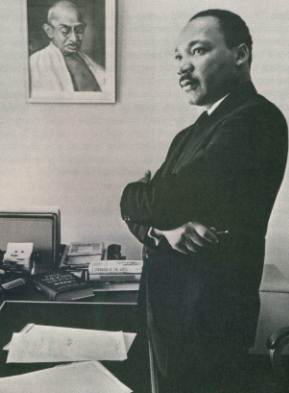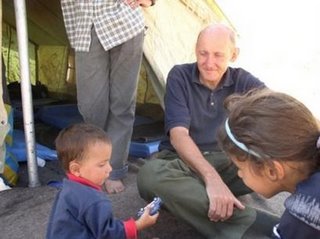History has it that Shakespeare was a partner in a newly organized company, The Chamberlain's Men, which dominated "the Elizabethan and the Jacobean stage (in the later period under the sponsorship of King James himself), performing publicly at the famous Globe playhouse and for smaller audiences at the Blackfriars. Along with its best-known actors, Richard Burbage and William Kemp, he received payment for presenting two plays before the Queen at court during the Christmas festivities of 1594. The Chamberlain's Men had not infrequent occasion to offer such command performances; and after 1603, when the troup became His Majesty's Servants, its sharers were officially treated as members of the royal household." (Harry Levin in
The Riverside Shakespeare, Houghton Mifflin Company, Boston, 1974)
In some modern productions of Hamlet, the first twenty-five or so lines of Act V, Scene I are cut out, presumably because the meaning of and humor in its double and triple entendre, being little understood by those who live at such a remove from the experience of people for whom the Bible was life's single most informative text and from writers and actors who worked under the patronage of kings and princes, have been rendered obscure by the mists of time.
SCENE I. A churchyard. Enter two Clowns [with spades, & mattocks].
First Clown: Is she to be buried in Christian burial when she wilfully seeks her own salvation?
Second Clown: I tell thee she is, therefore make her grave straight. The crowner [coroner] hath sat on her, and finds it Christian burial.
First Clown: How can that be, unless she drown'd herself in her own defence?
Second Clown: Why, 'tis found so.
First Clown: It must be 'se offendendo'; it cannot be else. For here lies the point: if I drown myself wittingly, it argues an act; and an act hath three branches - it is, to act, to do, to perform: argal, she drowned herself wittingly.
Second Clown: Nay, but hear you, goodman delver--
First Clown: Give me leave. Here lies the water; good, here stands the man, good; if the man go to this water, and drown himself, it is, will he, nill he, he goes,--mark you that; but if the water come to him and drown him, he drowns not himself, argal, he that is not guilty of his own death shortens not his own life.
Second Clown: But is this law?
First Clown: Ay, marry, is't; crowner's quest law.
Second Clown: Will you ha' the truth on't? If this had not been a gentlewoman, she should have been buried out o' Christian burial.
First Clown: Why, there thou say'st: and the more pity that great folk should have countenance in this world to drown or hang themselves, more than their even Christian. Come, my spade. There is no ancient gentleman but gardeners, ditchers, and grave-makers; they hold up Adam's profession.
Second Clown: Was he a gentleman?
First Clown: He was the first that ever bore arms.
Second Clown: Why, he had none.
First Clown: What, art a heathen? How dost thou understand the Scripture? The Scripture says 'Adam digged, 'could he dig without arms? I'll put another question to thee, if thou answerest me not to the purpose, confess thyself--
Second Clown: Go to.
First Clown: What is he that builds stronger than either the mason, the shipwright, or the carpenter?
Second Clown: The gallows-maker; for that frame outlives a thousand tenants.
First Clown: I like thy wit well, in good faith: the gallows does well; but how does it well? it does well to those that do ill. Now thou dost ill to say the gallows is built stronger than the church: argal, the gallows may do well to thee. To't again, come.
Second Clown: 'Who builds stronger than a mason, a shipwright, or a carpenter?'
First Clown: Ay, tell me that, and unyoke.
Second Clown: Marry, now I can tell.
First Clown: To't.
Second Clown: Mass, I cannot tell.
[Enter HAMLET and HORATIO, at a distance]
First Clown: Cudgel thy brains no more about it, for your dull ass will not mend his pace with beating; and, when you are asked this question next, say 'a grave-maker: 'the houses that he makes last till doomsday. Go, get thee to Yaughan: fetch me a stoup of liquor.
[Exit Second Clown. First Clown digs and sings]
First Clown: In youth, when I did love, did love,
Methought it was very sweet,
To contract, O, the time, for, ah, my behove,
O, methought, there was nothing meet.
HAMLET: Has this fellow no feeling of his business, that he sings at grave-making?
HORATIO: Custom hath made it in him a property of easiness.
HAMLET: 'Tis e'en so; the hand of little employment hath the daintier sense.
First Clown [sings]: But age, with his stealing steps,
Hath claw'd me in his clutch,
And hath shipped me intil the land,
As if I had never been such.
[throws up a skull]
HAMLET: That skull had a tongue in it, and could sing once: how the knave jowls it to the ground, as if it were Cain's jaw-bone, that did the first murder! It might be the pate of a politician, which this ass now o'er-reaches; one that would circumvent God, might it not?
HORATIO: It might, my lord.
HAMLET: Or of a courtier; which could say 'Good morrow,sweet lord! How dost thou, good lord?' This might be my lord such-a-one, that praised my lord such-a-one's horse, when he meant to beg it; might it not?
HORATIO: Ay, my lord.
HAMLET: Why, e'en so, and now my Lady Worm's; chapless, and knocked about the mazzard with a sexton's spade. Here's fine revolution, an we had the trick to see't. Did these bones cost no more the breeding, but to play at loggats with 'em? mine ache to think on't.
First Clown [Sings]: A pick-axe, and a spade, a spade,
For and a shrouding sheet,
O, a pit of clay for to be made
For such a guest is meet.
[Throws up another skull]
HAMLET: There's another. Why may not that be the skull of a lawyer? Where be his quiddities now, his quillets, his cases, his tenures, and his tricks? why does he suffer this rude knave now to knock him about the sconce with a dirty shovel, and will not tell him of his action of battery? Hum! This fellow might be in's time a great buyer of land, with his statutes, his recognizances, his fines, his double vouchers, his recoveries: is this the fine of his fines, and the recovery of his recoveries, to have his fine pate full of fine dirt? will his vouchers vouch him no more of his purchases, and double ones too, than the length and breadth of a pair of indentures? The very conveyances of his lands will hardly lie in this box; and must the inheritor himself have no more, ha?
HORATIO: Not a jot more, my lord.
HAMLET: Is not parchment made of sheepskins?
HORATIO: Ay, my lord, and of calf-skins too.
HAMLET: They are sheep and calves which seek out assurance in that. I will speak to this fellow. Whose grave's this, sirrah?
First Clown: Mine, sir. [Sings]
O, a pit of clay for to be made
For such a guest is meet.
HAMLET: I think it be thine, indeed; for thou liest in't.
First Clown: You lie out on't, sir, and therefore it is not yours. For my part, I do not lie in't, and yet it is mine.
HAMLET : 'Thou dost lie in't, to be in't and say it is thine, 'tis for the dead, not for the quick; therefore thou liest.
First Clown: 'Tis a quick lie, sir; 'twill away gain, from me to you.
HAMLET: What man dost thou dig it for?
First Clown: For no man, sir.
HAMLET: What woman, then?
First Clown: For none, neither.
HAMLET: Who is to be buried in't?
First Clown: One that was a woman, sir; but, rest her soul, she's dead.
HAMLET: How absolute the knave is! we must speak by the card, or equivocation will undo us. By the Lord, Horatio, these three years I have taken a note of it; the age is grown so picked that the toe of the peasant comes so near the heel of the courtier, he gaffs his kibe. How long hast thou been a grave-maker?
First Clown: Of all the days i' the year, I came to't that day that our last king Hamlet overcame Fortinbras.
HAMLET: How long is that since?
First Clown: Cannot you tell that? every fool can tell that: it was the very day that young Hamlet was born; he that is mad, and sent into England.
HAMLET: Ay, marry, why was he sent into England?
First Clown: Why, because he was mad. He shall recover his wits there; or, if he do not, it's no great matter there.
HAMLET: Why?
First Clown: 'Twill, a not be seen in him there; there the men are as mad as he.
HAMLET: How came he mad?
First Clown: Very strangely, they say.
HAMLET: How strangely?
First Clown: Faith, e'en with losing his wits.
HAMLET: Upon what ground?
First Clown: Why, here in Denmark: I have been sexton here, man and boy, thirty years.
HAMLET: How long will a man lie i' the earth ere he rot?
First Clown: I' faith, if he be not rotten before he die--as we have many pocky corses now-a-days, that will scarce hold the laying in--he will last you some eight year or nine year: a tanner will last you nine year.
HAMLET: Why he more than another?
First Clown: Why, sir, his hide is so tanned with his trade, that he will keep out water a great while; and your water is a sore decayer of your whoreson dead body. Here's a skull now; this skull has lain in the earth three and twenty years.
HAMLET: Whose was it?
First Clown: A whoreson mad fellow's it was: whose do you think it was?
HAMLET: Nay, I know not.
First Clown: A pestilence on him for a mad rogue! a' poured a flagon of Rhenish on my head once. This same skull, sir, was Yorick's skull, the king's jester.
HAMLET: This?
First Clown: E'en that.
HAMLET: Let me see. [takes the skull]
Alas, poor Yorick! I knew him, Horatio, a fellow of infinite jest, of most excellent fancy: he hath borne me on his back a thousand times; and now, how abhorred in my imagination it is! my gorge rims at it. Here hung those lips that I have kissed I knownot how oft. Where be your gibes now? your gambols? your songs? your flashes of merriment, that were wont to set the table on a roar? Not one now, to mock your own grinning? quite chap-fallen? Now get you to my lady's chamber, and tell her, lether paint an inch thick, to this favour she must come; make her laugh at that. Prithee, Horatio, tell me one thing.
HORATIO: What's that, my lord?
HAMLET: Dost thou think Alexander looked o' this fashion i'the earth?
HORATIO: E'en so.
HAMLET: And smelt so? pah! [puts down the skull]
HORATIO: E'en so, my lord.
HAMLET: To what base uses we may return, Horatio! Why may not imagination trace the noble dust of Alexander, till he find it stopping a bung-hole?
HORATIO: 'Twere to consider too curiously, to consider so.
HAMLET: No, faith, not a jot; but to follow him thither with modesty enough, and likelihood to lead it, as thus, Alexander died, Alexander was buried, Alexander returneth into dust; the dust is earth; of earth we make loam; and why of that loam, whereto he was converted, might they not stop a beer-barrel?
Imperious Caesar, dead and turn'd to clay,
Might stop a hole to keep the wind away.
O, that that earth, which kept the world in awe,
Should patch a wall to expel the winter flaw!
But soft! but soft awhile, here comes the King.
* * *
True it is, you mortals are of earthly, animal origin; your frame is indeed dust. But if you actually will, if you really desire, surely the heritage of the ages is yours, and you shall someday serve throughout the universes in your true characters -- children of the Supreme God of experience and divine sons of the Paradise Father of all personalities. (The Urantia Papers, Paper 112)

The spirit never drives, only leads. If you are a willing learner, if you want to attain spirit levels and reach divine heights, if you sincerely desire to reach the eternal goal, then the divine Spirit will gently and lovingly lead you along the pathway of sonship and spiritual progress. Every step you take must be one of willingness, intelligent and cheerful cooperation. The domination of the Spirit is never tainted with coercion nor compromised by compulsion. (The Urantia Papers, Paper 34)
Social leadership is transformed by spiritual insight; religion prevents all collective movements from losing sight of their true objectives. Together with children, religion is the great unifier of family life, provided it is a living and growing faith. (The Urantia Papers, Paper 99)
No social system or political regime which denies the reality of God can contribute in any constructive and lasting manner to the advancement of human civilization. But Christianity, as it is subdivided and secularized today, presents the greatest single obstacle to its further advancement; especially is this true concerning the Orient. (The Urantia Papers, Paper 195)

And as ye would that men should do to you, do ye also to them likewise. — Jesus, Luke 6:31, King James Version.
Not one of you truly believes until you wish for others what you wish for yourself. — The Prophet Muhammad (PBUH) Hadith
What is hateful to you, do not do to your neighbor. This is the whole Torah; all the rest is commentary. — Hillel, Talmud, Shabbath 31a

God assigns angels to do many things on earth. They are ministering spirits sent to serve . . .(Hebrews 1:14)
The Discerner of Spirits. A special liaison exists between the counselors and advisers of the second Havona circle and these reflective angels. They are the only seconaphim attached to the Universal Censors but are probably the most uniquely specialized of all their fellows. Regardless of the source or channel of information, no matter how meager the evidence at hand, when it is subjected to their reflective scrutiny, these discerners will forthwith inform us as to the true motive, the actual purpose, and the real nature of its origin. I marvel at the superb functioning of these angels, who so unerringly reflect the actual moral and spiritual character of any individual concerned in a focal exposure.
The Discerners of Spirits carry on these intricate services by virtue of inherent "spiritual insight," if I may use such words in an endeavor to convey to the human mind the thought that these reflective angels thus function intuitively, inherently, and unerringly. When the Universal Censors behold these presentations, they are face to face with the naked soul of the reflected individual; and this very certainty and perfection of portraiture in part explains why the Censors can always function so justly as righteous judges. The discerners always accompany the Censors on any mission away from Uversa, and they are just as effective out in the universes as at their Uversa headquarters.
I assure you that all these transactions of the spirit world are real, that they take place in accordance with established usages and in harmony with the immutable laws of the universal domains. The beings of every newly created order, immediately upon receiving the breath of life, are instantly reflected on high; a living portrayal of the creature nature and potential is flashed to the superuniverse headquarters. Thus, by means of the discerners, are the Censors made fully cognizant of exactly "what manner of spirit" has been born on the worlds of space.

So it is with mortal man: The Mother Spirit of Salvington knows you fully, for the Holy Spirit on your world "searches all things," and whatsoever the divine Spirit knows of you is immediately available whenever the secoraphic discerners reflect with the Spirit concerning the Spirit's knowledge of you. It should, however, be mentioned that the knowledge and plans of the Father fragments are not reflectible. The discerners can and do reflect the presence of the Adjusters (and the Censors pronounce them divine), but they cannot decipher the content of the mindedness of the Mystery Monitors.
In the same manner as their fellows, these angels are created serially and in seven reflective types, but these types are not assigned individually to the separate services of the superuniverse administrators. All tertiary seconaphim are collectively assigned to the Trinitized Sons of Attainment, and these ascendant sons use them interchangeably; that is, the Mighty Messengers can and do utilize any of the tertiary types, and so do their co-ordinates, Those High in Authority and Those without Name and Number. These seven types of tertiary seconaphim are:
The Significance of Origins. The ascendant Trinitized Sons of a superuniverse government are charged with the responsibility of dealing with all issues growing out of the origin of any individual, race, or world; and the significance of origin is the paramount question in all our plans for the cosmic advancement of the living creatures of the realm. All relationships and the application of ethics grow out of the fundamental facts of origin. Origin is the basis of the relational reaction of the Gods. Always does the Conjoint Actor "take note of the man, in what manner he was born."
With the higher descendant beings, origin is simply a fact to be ascertained; but with the ascending beings, including the lower orders of angels, the nature and circumstances of origin are not always so clear, though of equally vital importance at almost every turn of universe affairs—hence the value of having at our disposal a series of reflective seconaphim who can instantly portray anything required respecting the genesis of any being in either the central universe or throughout the entire realm of a superuniverse.
The Significances of Origins are the living ready-reference genealogies of the vast hosts of beings—men, angels, and others—who inhabit the seven superuniverses. They are always ready to supply their superiors with an up-to-date, replete, and trustworthy estimate of the ancestral factors and the current actual status of any individual on any world of their respective superuniverses; and their computation of possessed facts is always up to the minute.
The Memory of Mercy. These are the actual, full and replete, living records of the mercy which has been extended to individuals and races by the tender ministrations of the instrumentalities of the Infinite Spirit in the mission of adapting the justice of righteousness to the status of the realms, as disclosed by the portrayals of the Significance of Origins. The Memory of Mercy discloses the moral debt of the children of mercy—their spiritual liabilities—to be set down against their assets of the saving provision established by the Sons of God. In revealing the Father's pre-existent mercy, the Sons of God establish the necessary credit to insure the survival of all. And then, in accordance with the findings of the Significance of Origins, a mercy credit is established for the survival of each rational creature, a credit of lavish proportions and one of sufficient grace to insure the survival of every soul who really desires divine citizenship.
The Memory of Mercy is a living trial balance, a current statement of your account with the supernatural forces of the realms. These are the living records of mercy ministration which are read into the testimony of the courts of Uversa when each individual's right to unending life comes up for adjudication, when "thrones are cast up and the Ancients of Days are seated. The broadcasts of Uversa issue and come forth from before them; thousands upon thousands minister to them, and ten thousand times ten thousand stand before them. The judgment is set, and the books are opened." And the books which are opened on such a momentous occasion are the living records of the tertiary seconaphim of the superuniverses. The formal records are on file to corroborate the testimony of the Memories of Mercy if they are required.
The Memory of Mercy must show that the saving credit established by the Sons of God has been fully and faithfully paid out in the loving ministry of the patient personalities of the Third Source and Center. But when mercy is exhausted, when the "memory" thereof testifies to its depletion, then does justice prevail and righteousness decree. For mercy is not to be thrust upon those who despise it; mercy is not a gift to be trampled under foot by the persistent rebels of time. Nevertheless, though mercy is thus precious and dearly bestowed, your individual drawing credits are always far in excess of your ability to exhaust the reserve if you are sincere of purpose and honest of heart.

The mercy reflectors, with their tertiary associates, engage in numerous superuniverse ministries, including the teaching of the ascending creatures. Among many other things the Significances of Origins teach these ascenders how to apply spirit ethics, and following such training, the Memories of Mercy teach them how to be truly merciful. While the spirit techniques of mercy ministry are beyond your concept, you should even now understand that mercy is a quality of growth. You should realize that there is a great reward of personal satisfaction in being first just, next fair, then patient, then kind. And then, on that foundation, if you choose and have it in your heart, you can take the next step and really show mercy; but you cannot exhibit mercy in and of itself. These steps must be traversed; otherwise there can be no genuine mercy. There may be patronage, condescension, or charity—even pity—but not mercy. True mercy comes only as the beautiful climax to these preceding adjuncts to group understanding, mutual appreciation, fraternal fellowship, spiritual communion, and divine harmony.
The Import of Time. Time is the one universal endowment of all will creatures; it is the "one talent" intrusted to all intelligent beings. You all have time in which to insure your survival; and time is fatally squandered only when it is buried in neglect, when you fail so to utilize it as to make certain the survival of your soul. Failure to improve one's time to the fullest extent possible does not impose fatal penalties; it merely retards the pilgrim of time in his journey of ascent. If survival is gained, all other losses can be retrieved.
In the assignment of trusts the counsel of the Imports of Time is invaluable. Time is a vital factor in everything this side of Havona and Paradise. In the final judgment before the Ancients of Days, time is an element of evidence. The Imports of Time must always afford testimony to show that every defendant has had ample time for making decisions, achieving choice.
These time evaluators are also the secret of prophecy; they portray the element of time which will be required in the completion of any undertaking . . . The Gods foresee, hence foreknow; but the ascendant authorities of the universes of time must consult the Imports of Time to be able to forecast events of the future.
You will first encounter these beings on the mansion worlds, and they will there instruct you in the advantageous use of that which you call "time," both in its positive employment, work, and in its negative utilization, rest. Both uses of time are important.

The Solemnity of Trust. Trust is the crucial test of will creatures. Trustworthiness is the true measure of self-mastery, character. These seconaphim accomplish a double purpose in the economy of the superuniverses: They portray to all will creatures the sense of the obligation, sacredness, and solemnity of trust. At the same time they unerringly reflect to the governing authorities the exact trustworthiness of any candidate for confidence or trust.
On Urantia, you grotesquely essay to read character and to estimate specific abilities, but on Uversa we actually do these things in perfection. These seconaphim weigh trustworthiness in the living scales of unerring character appraisal, and when they have looked at you, we have only to look at them to know the limitations of your ability to discharge responsibility, execute trust, and fulfill missions. Your assets of trustworthiness are clearly set forth alongside your liabilities of possible default or betrayal.
It is the plan of your superiors to advance you by augmented trusts just as fast as your character is sufficiently developed to gracefully bear these added responsibilities, but to overload the individual only courts disaster and insures disappointment. And the mistake of placing responsibility prematurely upon either man or angel may be avoided by utilizing the ministry of these infallible estimators of the trust capacity of the individuals of time and space. These seconaphim ever accompany Those High in Authority, and never do these executives make assignments until their candidates have been weighed in the secoraphic balances and pronounced "not wanting."
The Sanctity of Service. The privilege of service immediately follows the discovery of trustworthiness. Nothing can stand between you and opportunity for increased service except your own untrustworthiness, your lack of capacity for appreciation of the solemnity of trust.

Service—purposeful service, not slavery—is productive of the highest satisfaction and is expressive of the divinest dignity. Service—more service, increased service, difficult service, adventurous service, and at last divine and perfect service—is the goal of time and the destination of space. But ever will the play cycles of time alternate with the service cycles of progress. And after the service of time there follows the superservice of eternity. During the play of time you should envision the work of eternity, even as you will, during the service of eternity, reminisce the play of time.
The universal economy is based on intake and output; throughout the eternal career you will never encounter monotony of inaction or stagnation of personality. Progress is made possible by inherent motion, advancement grows out of the divine capacity for action, and achievement is the child of imaginative adventure. But inherent in this capacity for achievement is the responsibility of ethics, the necessity for recognizing that the world and the universe are filled with a multitude of differing types of beings. All of this magnificent creation, including yourself, was not made just for you. This is not an egocentric universe. The Gods have decreed, "It is more blessed to give than to receive," and said your Master Son, "He who would be greatest among you let him be server of all." (The Urantia Papers, Paper 28)

. . . no Son could hope for final success without the incessant co-operation of the Divine Minister and her vast assemblage of spirit helpers, the daughters of God, who so faithfully and valiantly struggle for the welfare of mortal men and the glory of their divine parents. (The Urantia Book, Paper 33)

The angels develop an abiding affection for their human associates; and you would, if you could only visualize the seraphim, develop a warm affection for them. Divested of material bodies, given spirit forms, you would be very near the angels in many attributes of personality. They share most of your emotions and experience some additional ones. The only emotion actuating you which is somewhat difficult for them to comprehend is the legacy of animal fear that bulks so large in the mental life of the average [person]. The angels really find it hard to understand why you will so persistently allow your higher intellectual powers, even your religious faith, to be so dominated by fear, so thoroughly demoralized by the thoughtless panic of dread and anxiety. (The Urantia Book, Paper 113)

On December 21, 1970, Elvis Presley arrived at the White House carrying a commerative WWII Colt .45 semi-automatic pistol. Being a collector of badges, he wished to trade the gun to President Richard Nixon for a Bureau of Narcotics and Dangerous Drugs (BNDD) badge. Elvis got his badge, and the pistol is now on display at the Richard Nixon Library in Yorba Linda, California. Presley died as a result of his addiction to drugs; Nixon was forced to resign from the presidency in disgrace after he was caught trying to cover up a failed burglary carried out by political espionage operatives in the employ of his re-election campaign.
Elvis was a reader of the Urantia Papers, as were and are a number of other famous people. These include Norman Lear, who had one of the more influential careers in the history of television (
All in the Family,
Sanford and Son,
Maude,
The Jeffersons,
Good Times,
Mary Hartman, Mary Hartman);
Star Trek creator/writer/producer Gene Roddenberry; science fiction author Frank Herbert (
Dune); Buffy St. Marie (Canadian Native American musician, composer, visual artist, educator and social activist); Mo Segal (founder of Celestial Seasonings); actor Jackie Gleason (
The Honeymooners); and rock-and-roll legends Jimmy Hendrix, Jerry Garcia, the Moody Blues, Spirit, and Janis Joplin. The Urantia Papers' popularity among entertainment industry figures is one of the best kept open secrets of our time. Because some of the Papers' teachings have been perceived to conflict with Zionist and fundamentalist Christian theology and ideology, most of the entertainment industry figures publicly associated with the Papers, as you may have noted, are either dead, and thus at no risk of reprisal, or are Jewish and independently wealthy and thus able to afford to be open about beliefs that might well otherwise put them at risk of reprisal. Many other entertainers have been and are readers of the Urantia Papers but are discreet about their interest in the Papers. It has been reliably reported that several U.S. presidents have been readers, and Ronald Reagan is said to have had the text on a bookshelf in the Oval Office, though it may be difficult for some to imagine that he was a serious student of the Papers. For many years the Urantia Papers were the subject of a copyright dispute in the federal courts. The dispute is perceived by many to have been one result of a well organized and largely successful covert effort by powerful ethnic and religious special interest groups to suppress the text and co-opt and marginalize reader organizations. Pat Robertson is one among many fundamentalist Christian leaders who believe the Holy Bible is the literal and inerrant word of God and who have publicly condemned the Urantia Papers. Robertson also predicted the world would end in 1982 following a war in the Middle East. That didn't happen, but Robertson and many of his celebrity Christian Zionist doomsday cult colleagues are still trying to gin up their world-ending war, an indication of what passes for "
religious idealism" in the minds of some who claim to be followers of the Prince of Peace. A 2001 federal court ruling put the Urantia Papers in the public domain.
* * *
Political wisdom. Emotional maturity is essential to self-control. Only emotional maturity will insure the substitution of international techniques of civilized adjudication for the barbarous arbitrament of war. Wise statesmen will sometime work for the welfare of humanity even while they strive to promote the interest of their national or racial groups. Selfish political sagacity is ultimately suicidal—destructive of all those enduring qualities which insure planetary group survival. (The Urantia Papers, Paper 52)

". . . this crusade, this war on terrorism, is going to take awhile." President George W. Bush, September 16, 2001
Genuine religion takes nothing away from human existence, but it does add new meanings to all of life; it generates new types of enthusiasm, zeal, and courage. It may even engender the spirit of the crusader, which is more than dangerous if not controlled by spiritual insight and loyal devotion to the commonplace social obligations of human loyalties. (The Urantia Papers, Paper 100)
Idealism can never survive on an evolving planet if the idealists in each generation permit themselves to be exterminated . . . And here is the great test of idealism: Can an advanced society maintain that military preparedness which renders it secure from all attack by its . . . neighbors without yielding to the temptation to employ this military strength in offensive operations against other peoples for purposes of selfish gain or national aggrandizement? National survival demands preparedness, and religious idealism alone can prevent the prostitution of preparedness into aggression. Only love, brotherhood, can prevent the strong from oppressing the weak. (The Urantia Papers, Paper 71)
The overstressed and isolated morality of modern religion, which fails to hold the devotion and loyalty of many twent[y-first]-century men [and women], would rehabilitate itself if, in addition to its moral mandates, it would give equal consideration to the truths of science, philosophy, and spiritual experience, and to the beauties of the physical creation, the charm of intellectual art, and the grandeur of genuine character achievement. (The Urantia Book, Paper 2)

 Baking a Prayer for Peace
Baking a Prayer for Peace



























